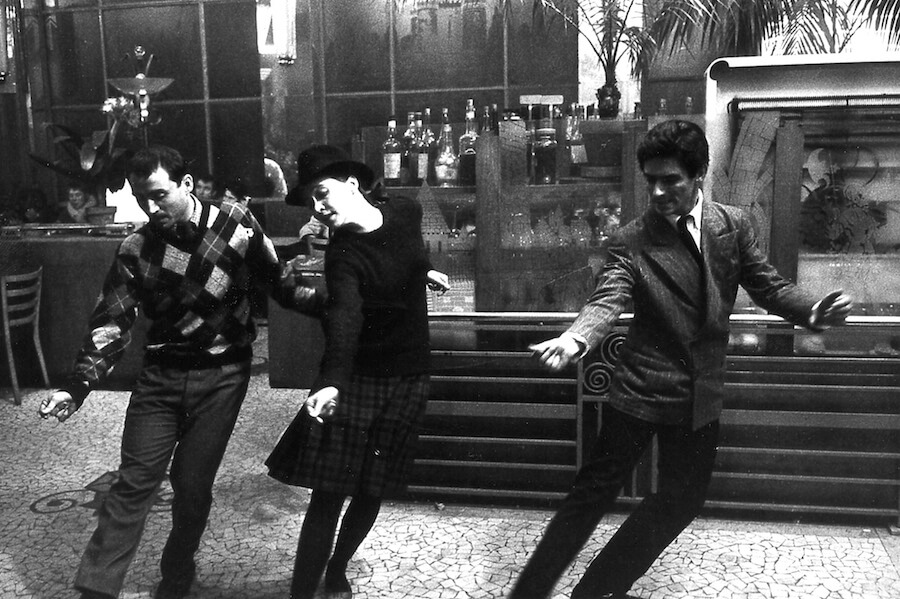‘Band of Outsiders’ The Godard movie you use to turn people into Godard-heads, “Band of Outsiders” wasn’t, as it were, always liked. When it bowed in 1964, not all of the director’s fans — including certain colleagues in the French New Wave — were happy. (One of its detractors: Godard himself, who’s called it one of his worst.) Some treated his latest, produced by a big American studio (Columbia), like his sell-out film — or as sell-out as someone as severely modernist as Godard could be. No question “Outsiders” is as straightforward (and therefore approachable) as his cinema gets. But saying that is to say it’s still fragmented and formally playful, easily distracted and casual about mixing genres. It begs you to underrate it. For one thing, what is it? Is it a crime film? Is it a youth film? Is it a Godard film? It’s all three, but mostly the third. Like “Shoot the Piano Player,” made by the filmmaker’s friend-turned-foe Francois Truffaut three years earlier, it’s adapted (loosely) from American pulp fiction. “Outsiders” follows the general plot of “Fool’s Gold,” by Dolores Hitchens: Two petty thieves (Claude Brasseur and Sami Frey) coerce a young woman (Anna Karina) into helping them swipe a booty from her aunt’s villa. But that leaves plenty of time to kill before the big swindle. RELATED: “Dragon Inn” is a martial arts classic as beautiful as it is thrilling And so Godard burns the running time on whatever he wants. If the only thing it gave us was the immortal, sloppy, “impromptu” Madison dance in the cafe, it would still be an unstoppable classic. But there’s more: the record-breaking dash through the Louvre; the minute of literal silence (actually only about 38 seconds before they get bored and break it); the wry, omnipotent narrator (Godard himself), who makes Brechtian jokes and, at one point, tells us the random thoughts in our young heroes’ heads. Sometimes he just has his actors sit and read aloud from the newspaper. The best joke, though, is in the credits: When composer Michel Legrand’s name comes up, it announces this as his final score for the screen. His most recent movie credit was for the 2014 French dramedy “The Price of Fame.” Godard may seem to be in a rare good mood, but not all is upbeat. It’s shot in Paris’ grungiest locations, and the skies are overcast and gray. The scenes in the aunt’s home are oppressively, blindingly white, with so little hanging on the walls that the climax seems like it’s shifted into a Bergman film. And we can’t forget that our freewheeling trio are up to no good. Our two male heroes may act like fun guys — in the opening minutes they play Pat Garrett and Billy the Kid — but Brasseur’s Arthur, at least, isn’t joking. A confident ladies man when pursuing Karina’s Odile, he turns into a scary tough when the heist begins in earnest. RELATED: BAM’s “Labor of Love” is a series on cinematic courtship Then there’s Karina herself. This isn’t the manic pixie you see in “A Woman is a Woman” three years prior; indeed, at a screening that showed both, some viewers didn’t realize they starred the same person. Clad in a frumpy sweater, she looks despondent, fragile, as though she forever wanted to slink away. Indeed, Karina was coming off a suicide attempt, plus another bump in her marriage to Godard. He made the film in part to mend their relationship, and yet he punishes her with intrusive, endless close-ups in which she looks like she can’t bear the camera’s long, hard stare. Karina later said “Outsiders” was therapeutic. It did “save” her, and by the next year’s “Pierrot le fou” she’s back in bubbly spirits — despite (or maybe because of) it being their second film after their divorce papers were filed. If Godard made “Outsiders” in part to attract financing for more adventurous fare — like his next one, the boldly experimental follow-up, “A Married Woman” — he couldn’t help being Godard. It’s accessible but also stubborn, charming but also a downer.
Director: Jean-Luc Godard
Stars: Anna Karina, Claude Brasseur
Rating: NR
4 (out of 5) Globes
‘Band of Outsiders’ only looks like the most accessible Godard film

Follow Matt Prigge on Twitter @mattprigge
















